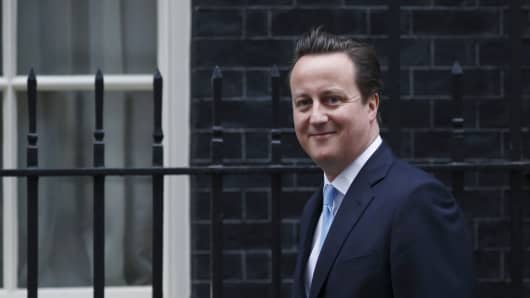U.K. Prime Minister David Cameron appeared to be distancing himself increasingly from other European Union countries at a European summit on Friday. At the gathering, he said he was prepared to block a European Union budget deal if it is not acceptable to Britain's interest, whilst his appearance left fellow politicians highlighting his increasing disengagement from the European table.
Leaders of the European Union member states met on Thursday and Friday and made steps to implementing a single bank supervisor for the euro zone, however budget negotiations for the EU won't take place until next month
At a press conference Cameron said that any deal would be beneficial but warned against any huge increase in EU spending at this difficult time.
"So the British public expects a tough approach, a rigorous approach and that's exactly what they'll get, and if we can't get a deal .... if there isn't a deal that's good for Britain, if there isn't a deal that's available, then there won't be a deal," he said.
Investment bank Nomura outlined a 'Brixit' scenario in August under which the U.K would exit the European Union. Alistair Newton, senior political analyst at Nomura says its impact was hard to quantify, but believed it could raise both economic and political concerns, including in financial markets.
And it's not just budget deals or a bank supervisor that are causing the Prime Minister problems. Britain is currently mulling over an opt-out from the EU cooperation on cross-border policing and justice.
"We need to discuss the future of Europe, but we need to solve the current problems of Great Britain," the President of the European Parliament, Martin Schulz, said at a press conference.
Schulz is due to initiate a parliamentary debate about how a country could opt out of a particular policy with the U.K. in mind.
Schulz said he was well aware that 81 members of Cameron's party voted for a referendum on European membership last November — even if they were ultimately defeated.
"I don't think Mr.Cameron can ignore that trend within his own party. We have noted that, and noted that Mr.Cameron said he didn't rule out a referendum," he said.
Even as the leaders flocked into the summit past a phalanx of journalists, the divide was clear, with Germany's Angela Merkel and France's Francois Hollande eagerly telling reporters that banking supervision was very much on their mind.
In contrast, Cameron urged deregulation and trade deals with the U.S. and China, saying the European Union "still isn't finished, in digital, in services, in energy, and that is the agenda I'll be pushing very hard at this council".
This clear difference of agenda hasn't escaped Finnish Europe Minister Alexander Stubb, who told Reuters that he thought Britain was making a deliberate attempt to alienate itself from discussions.
"It's almost as if it's 26 plus 1, to be very honest....I think Britain is right now, voluntarily, by its own will, putting itself in the margins," he said.
"It's almost as if the boat is pulling away and one of our best friends is somehow saying 'bye bye' and there's not really that much we can do about it."
The British prime minister has previously promised to make a major speech about Britain's future relationship with Europe, perhaps even before December's EU summit.
It's thought any decision could form part of the Conservative Party's next election manifesto, thus leading to the possibility of a referendum in Britain after 2015.


